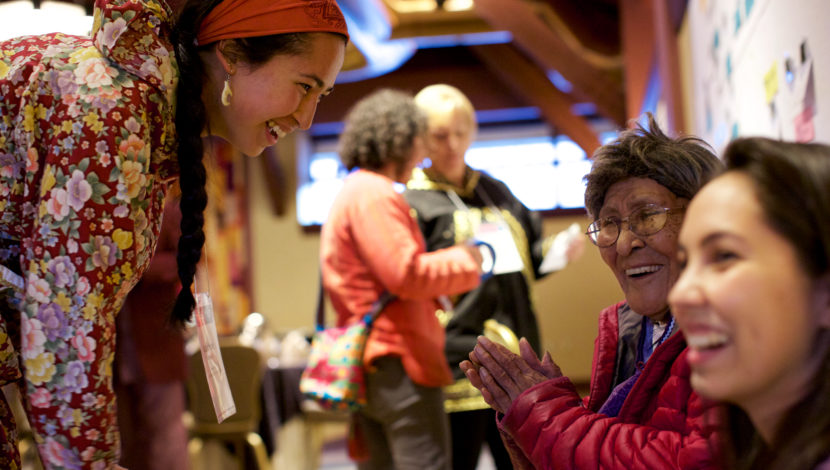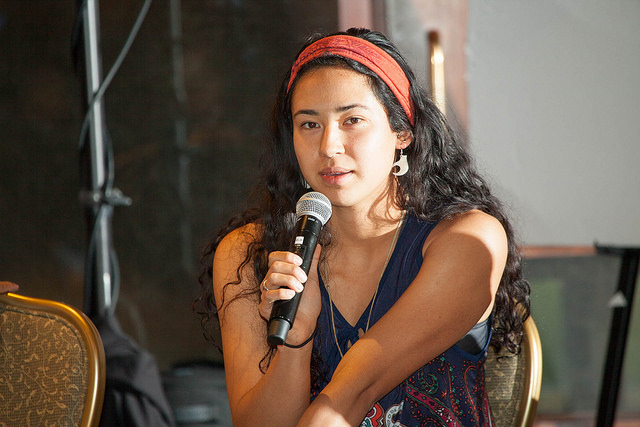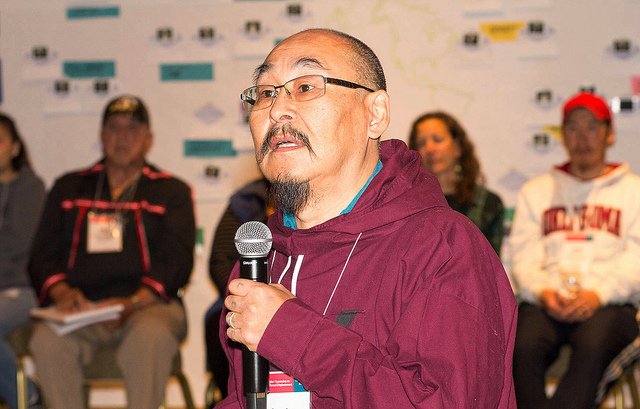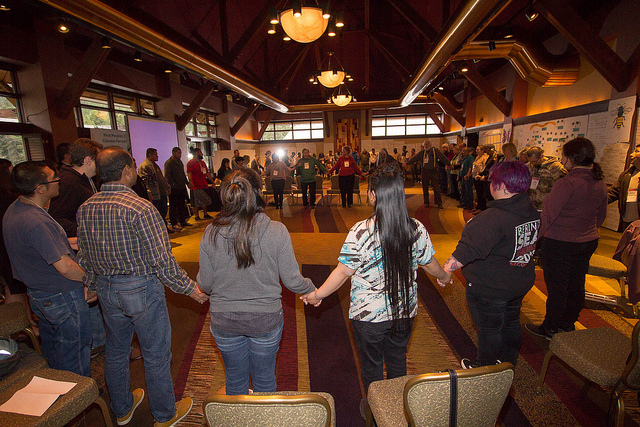The Unitarian Universalist Service Committee advances human rights through grassroots collaborations.
One Story: A Report of The First Peoples’ Convening on Climate-Forced Displacement

In October 2018, over sixty representatives of First and Indigenous communities met in Girdwood, Alaska, for a first-of-its-kind gathering: the First Peoples’ Convening on Climate-Forced Displacement (hereafter, First Peoples’ Convening). UUSC, the Climate Justice Resilience Fund (CJRF), and our partners, collaborated to make the First Peoples Convening a reality. UUSC played a leading role in the convening, including strategically identifying communities who face the threat of climate-forced displacement to attend and participate in this convening, developing a participatory design process, identified experienced facilitators, meeting frequently with a Core Planning Team, providing monthly informational briefs for participants, and covering the costs for the venue, travel for participants, facilitation, meals, and on-site support.
Representatives came from Alaska (Atmautluak, Bill Moore’s Slough, Chevak, Elim, Eyak, Golovin, Hamilton, Kotlik, Kwigillingok, Kivalina, Mary’s Igloo, Nelson Lagoon, Newtok, Nunapitchuk, Port Heiden, Shishmaref, Teller, Unalakleet), Louisiana (Atakapa-Ishak, Isle de Jean Charles, Pointe-Au-Chien), Washington (Quinault Indian Nation), Bangladesh, and the Pacific (Fiji, Kiribati, Palau, Papua New Guinea, Republic of the Marshall Islands, Samoa, Solomon Islands, Tuvalu). The group met for three days to powerfully share the ways in which rapid climate change is impacting their communities and traditional ways of life, share traditional knowledge and practices, and begin to develop a collective vision for the future.

“We are a spiritual people with ancestral knowledge. We are the stewards of the land. We have inherent rights. We are inclusive and empowered and we are the first peoples of the world.”
John Pingayaq, Chevak, Alaska
UUSC is proud to share One Story: A Report of the First Peoples Convening on Climate-Forced Displacement, which centers the ways the crisis of rapid climate change impacts our partners, calls for immediate action to curb this devastation, and demands solutions that advance the human rights and leadership of First and Indigenous Peoples.
Participants highlighted the urgent need for action to:
Curb Global Warming Now
The First and Indigenous Peoples who gathered in Alaska face devastating threats to their cultures, lands, human and environmental health, human rights, spirituality, well-being, traditional systems and livelihoods, food systems and food security, local infrastructure, economic viability, and their very survival. This climate crisis has been brought on by unsustainable development, continued fossil fuel extraction, and uncurbed carbon dioxide emissions. First and Indigenous Peoples, like those represented at the convening, have contributed the least to this crisis, yet bear the worst of its burdens. While the international community has made some significant strides in developing compacts and guidelines related to climate-forced displacement, it has tragically failed to do what is most needed: curb greenhouse gas emissions and stop global warming. The climate crisis is not a future or theoretical threat—urgent action is needed now.

Support First and Indigenous Peoples’ Solutions
While participants in the First Peoples’ Convening came from different parts of the globe and represent dozens of First and Indigenous Peoples, many expressed the importance of the traditional knowledge held by Indigenous Elders. Relearning and embracing Indigenous knowledge and ways of life is critical for Indigenous Peoples’ resilience and cultural survival in the face of rapid climate change. But society at large, too, is in desperate need of sustainable and respectful ways of living with the earth. As the declaration drafted by the participants reads, “We are a spiritual people empowered by values and beliefs that are urgently needed today to elevate humanity to an inclusive and peaceful truth that is based on an Indigenous knowledge system of the land, sea, and sky and on observations gained from the western knowledge system.” International governing bodies, funders, and government agencies urgently need to prioritize Indigenous communities’ climate solutions and bring First and Indigenous Peoples to the table to help bring about a paradigm shift to curb today’s climate crisis.
Uphold the Right to Self-Determination
Participants shared the challenges and stumbling blocks they have faced during decades of work on climate change mitigation, adaptation, and, for some, community resettlement projects needed to ensure their communities’ survival. These communities, who face layers of threats to their right to self-determination, are often not consulted, or are ignored, by government agencies considering climate adaptation measures that will impact them. The lack of enforcement of the international and domestic legal frameworks that protect their rights is paired with a dearth of funding to implement their solutions. Government actors across the globe must respect and protect Indigenous communities’ right to self-determination, particularly in relation to the perilous effects of climate change.
“We are the start of this. We are the first people that are experiencing all this. It will hit other people some day; they will have to ask us how we adapted. We are going to be the ones that know, because we are the ones who had to go through it first.”
Angela Johnson, Nelson Lagoon, Alaska
Key Takeaways
UUSC is advancing the work that flows from this convening, including supporting the nominated Declaration Team, which crafted the First Peoples and Indigenous Peoples Declaration following the Convening, in addition to producing a film, building the demands of the First Peoples Convening into our strategic climate justice work, and circulating the report.
